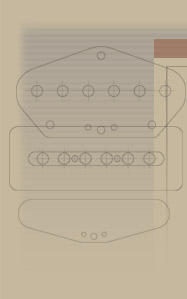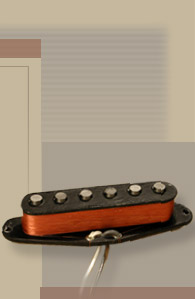|
I decided to address a little more directly
most musicians' concerns about buying custom hand-made pickups:
value versus pricing. Why would a guitar player pay over
$200 for a set of Strat pickups, for example, when he can
buy a namebrand product at most music stores for about $70
less?
You need to look at it from a more realistic
perspective. How many sets of aftermarket brand pickups
have you already
bought trying to nail your tone? Like most guitar players,
you probably have a box of pickups in a dusty drawer somewhere.
Add up the money you spent on those pickups and you are
already in the hole more than a good set of hand-wound,
hand-built pickups cost. Those pickups gathering dust were
wound by the hundreds on a machine that can never give you
the tone that a hand-made pickup will. Those pickups were
made for one thing...profit. The cost to make these types
of pickups is under $5, big profits are made without much
attention to good tone.
A set of my hand made pickups are something
you only buy once. You get your tone "nailed" for
you by a pickup tone specialist. I don’t wind scores
of pickups and pull them off the shelf for you like a
lot of small companies do. I wind each set for one guitar
player only–you. And after an in-depth consultation
with you to make sure I know exactly what you are trying
to achieve with your guitar and amp setup.
Great pickups can only be made by someone
with experience, someone who goes out every week and plays
his own work and has professional musicians use his work
so he can listen from the audience also. Great pickups are
only made by making alot of mistakes and then eventually
coming to a true understanding and knowledge with which
to make a pickup that is exceptional and a joy to play.
The art of tone is a science, and an art. You must have
experience in both to exel. My payoff is your joy of playing
when your guitar sounds great. I love getting those emails
and many of them you can read in my reviews or on Harmony
Central.
My pickups come from experience and the use
of several tehcnical instruments I use to see what is happening
in each coil. I don't use DC resistance as anything but
a rough guide, for tone shaping it is pretty much useless
information. A good LCR meter and spectrum analyzers are
much more useful. I had to learn most of this myself as
there is little published information on this and there
aren’t that many pickup makers who really know a lot
about it or will share the knowledge that makes good pickups
and money for them. I do have some pickup maker friends
who are't so shallow and we help each other with knowledge
and referrals if there's something that fits one of us better
than the other. (See my links section for that.) None of
us pickup makers know eveything. Some of the big 3 guys
will claim they do but you should see some of shoddy stuff
they sell that us small pickup craftsmen have to try to
repair. I made alot of experimental pickups, and still do,
to find out what works in the real world; alot of accepted
pickup knowledge you find on the internet are actually "myths"
passed down for years with little basis in fact. I don't
pretend to know everthing and I learn something new almost
every day, I've made discoveries I've never seen used or
heard of before, its all a ton of fun, but very hard work.
I never list my pickup’s DC resistance
readings to avoid people trying to copy my work. A pickup
doesn’t sound like its “Ohms” anway, I’m
sorry to blow that myth but its true. I can make you a 16
Ohm pickup that will be so screechingly bright it would
shock you. 16 ohms is supposed to be heavy and dark, but
if you know how to manipulate coils through many factors
that go into a pickup’s structure, you can design most
anything you would want and the readings don’t tell
the story, but the TONE does. I always shoot for optimal
tone, but I also make my pickups for tube amps and my goal
is great sound and enough PUSH to make a tube amp sound
its best and to give you a tone orgasm. So some of my pickups
would be considered “overwound” which is another
misleading concept. Most early 50's Fender pickups today
are considered overwound, there is really no such thing.
Some of my pickups would also be considered "underwound"
whatever that means, I just shoot for the "sweet spot"
where frequency response and output are balanced and make
you want to play and play.
My pickups are a true VALUE, dollar for dollar,
you will get a set of pickups that should blow you away,
or you send them back for a second try, or exchange. You
get pickups that are tailored to what YOU want to hear from
your guitar, not a set of pre-made pickups off the shelf
with a take-it-or-leave-it attitude. You get a set of pickups
that are DESIGNED not just mindless copies of someone else’s
or some vintage formula that sometimes works and mostly
doesn’t. You tell me what you want and I bend over
backwards to give it to you. I sure as hell do not want
ANYONE anywhere on some stage playing a set of my pickups
who isn’t blown away by them.
I have over 90% of my customers return for
more pickups after their first order, if that tells you
anything. If I can't make what you need I will refer you
to other pickup makers who can.
|


